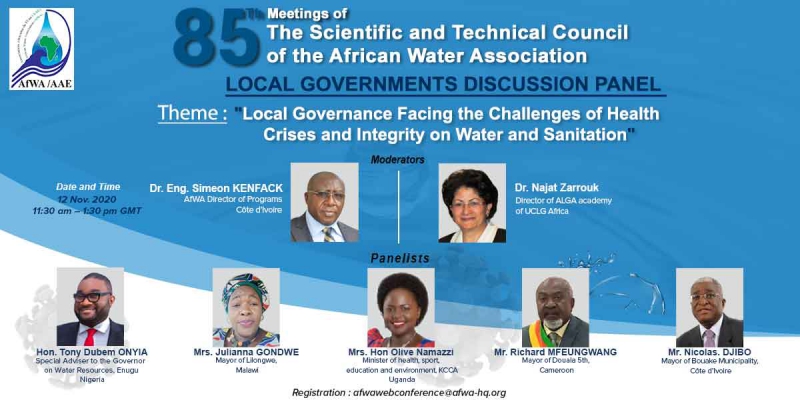As a prelude to the 85th session of its Scientific and Technical Council, the African Water Association organized a panel discussion with mayors and local governors from 5 African cities on Thursday, November 12, 2020, under the theme: "Local Governance Facing the Challenges of Health Crises and Integrity for Water and Sanitation".
Co-moderated by Dr. Najat ZARROUK, Director of the ALGA Academy of UCLG Africa and Dr. Simeon KENFACK, AfWA ‘s Programs Director, this panel was considered as a forum for governments to share with their peers, the experiences learned in managing the COVID-19 pandemic, as well as the difficulties of managing the work of providing water and sanitation services, especially from the point of view of acts of corruption, and approaches to solutions to combat the scourge.
Invited to this panel were Tony Dubem ONYIA, Special Advisor to the Governor for Water Resources, Enugu State, Nigeria; Julianna GONDWE, Mayor of Lilongwe, Malawi; Richard MFEUNGWANG, Mayor of Douala 5è, Cameroon; Nicolas DJIBO, Mayor of Bouaké Commune, Côte d'Ivoire and Honourable Olive Namazzi, Minister of Health, Sports, Education and Environment, KCCA, Uganda.
In their communication on the management of COVID 19, the 5 panelists presented similar actions implemented, particularly in terms of barrier measures to reduce the chain of transmission of the virus. These include the wearing of masks, social distancing, closure of public house, etc. In terms of water quality service management in the current pandemic environment, panelists reported that they have installed water tanks and water points in communities that do not have access to tap water; the installation of hand-washing stations in public services and places (markets, hospitals and schools), the installation of free or low-cost emergency toilet services in various locations, the provision of free water services to the population without disconnection in cities; the rehabilitation of failing water and sanitation systems, especially in rural areas; and the support of state governments was necessary for the strengthening of water and sanitation infrastructure.
The panelists all learned lessons from this health crisis, the very first one they faced in the exercise of their mandate, with the exception of Honourable Olive Namazzi, who experienced the cholera crisis in Uganda. This is why, in order to prevent or manage this type of situation in the future, they advocate capacity building of local structures in charge of water; the establishment of committees to monitor and raise awareness on personal and collective hygiene rules for behavioral change; the regular organization of environmental sanitation campaigns and training in disaster management; the improvement of emergency response systems, coherent and effective communication and finally the prioritization of the health sector in the investments budget.
On the issue of corruption, the panelists stated that they have unfortunately been confronted with it, particularly in the management of water and sanitation projects. The measures taken to deal with it include the establishment of integrated fight cells, with the support of civil society and village representatives for reporting such acts; the inclusion of measures to respond to corruption (restitution and/or jail) in legal instruments relating to water management.
The last point of discussion of this panel was related to the World Water Forum Dakar 2021 and in particular the support expected from AfWA for a strong mobilization of elected officials. In this sense, the panelists pleaded for a total or partial assumption of responsibility by AfWA for local governments. They recognized that this forum could offer them high level exchange frameworks, with a view to forging partnerships, and strengthen their capacities to be effective in their task.
The panel ended with the full satisfaction of the governors and their desire to see more of these types of meetings to learn from each other.

 English
English  Français
Français 
